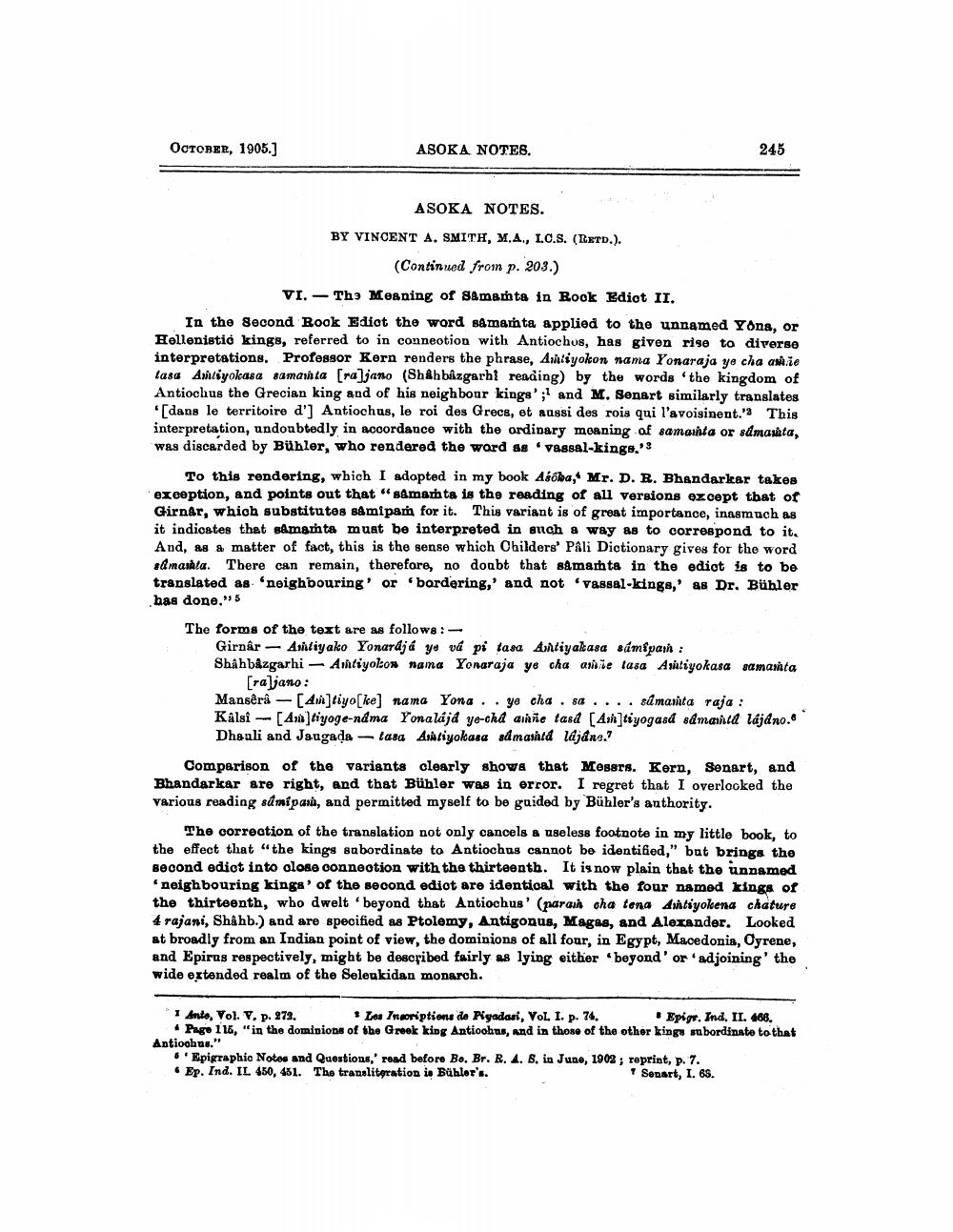________________
OCTOBER, 1905.]
ASOKA NOTES.
245
ASOKA NOTES. BY VINCENT A. SMITH, M.A., L.C.S. (RxTD.).
(Continued froin p. 203.) VI. - Thu Meaning of s&mamta in Rook Edict II. In the Second Book Ediot the word såmamta applied to the unnamed Yona, or Follonistió kings, referred to in conneotion with Antiochus, has given rise to diverso interpretations. Professor Kern renders the phrase, Arliyokon nama Yonaraja ya cha antie tasa Aniliyokasa samanhia [ra]jano (Shahbâzgarhi reading) by the words the kingdom of Antiochus the Grecian king and of his neighbour kings';' and M. Senart similarly translates "[dans le territoire d'] Antiochus, le roi des Grecs, et aussi des rois qui l'avoisinent." This interpretation, undoubtedly in accordance with the ordinary moaning af samainta or sdmaxta, was discarded by Bühler, who rendered the word as 'vassal-kings.'
To this rendering, which I adopted in my book Asoba, Mr. D. B. Bhandarkar takes exception, and points out that “samanta is the reading of all versions ezcept that of Girnar, which substitutes sAmipam for it. This variant is of great importance, inasmuch as it indicates that såmamta must be interpreted in such a way as to correspond to it, And, as a matter of fact, this is the sense which Childers' Páli Dictionary gives for the word
Amashta. There can remain, therefore, no doubt that samanta in the edict is to be translated as 'neighbouring' or 'bordering,' and not vassal-kings, as Dr. Bühler has done." 5
The forms of the text are as follows:
Girnar - Antiyako Yonardjá ye vá pi tasa Aliyakasa admipanh: Shahbâzgarhi - Antiyolcos nama Yonaraja ye cha ante lasa Astiyokasa samanta
[raljano: Mansêrâ — [Am]tiyo[ke] nama Yona . . ye cha .sa . . . . e maita raja : Kalsi - [A]tiyoge-ndma Yonalájd ye-chd ainne tasd [Ah]tiyogasd samanta lájdno.
Dhsali and Jaugada - lasa Ashtiyokara sdmashta idjdns.? Comparison of the variants clearly shows that Messrs. Kern, Senart, and Bhandarkar are right, and that Bühler was in error. I regret that I overlooked the various reading sumipas, and permitted myself to be guided by Bühler's anthority.
The correction of the translation not only cancels a useless footnote in my little book, to the effect that "the kings subordinate to Antiochus cannot be identified," bat brings the second adiot into olose connootion with the thirteenth. It is now plain that the unnamed .noighbouring kings of the second ediot are identioal with the four named kings of the thirteenth, who dwelt beyond that Antiochus' (parain cha tong Astiyokena chature 4 rajani, Shahb.) and are specified as Ptolemy, Antigonus, Magas, and Alexander. Looked at broadly from an Indian point of view, the dominions of all four, in Egypt, Macedonia, Oyrene, and Epirus respectively, might be described fairly as lying either beyond' or adjoining the wide extended realm of the Seleukidan monarch.
Anto, Vol. V, p. 273. Les Incoriptions de Piyadari, Vol. I. p. 74.
Epige. Ind. II. 466. 4 Page 116, "in the dominions of the Greek king Artioohas, and in those of the other kings subordinate to that Antiochus."
. Epigraphic Notes and Questions,' read before Bo. Br. R. 4. 8. in June, 1902; reprint, p. 7. • Ep. Ind. IL 450, 481. The translitgration is Bühler's.
Senart, I. 65.




